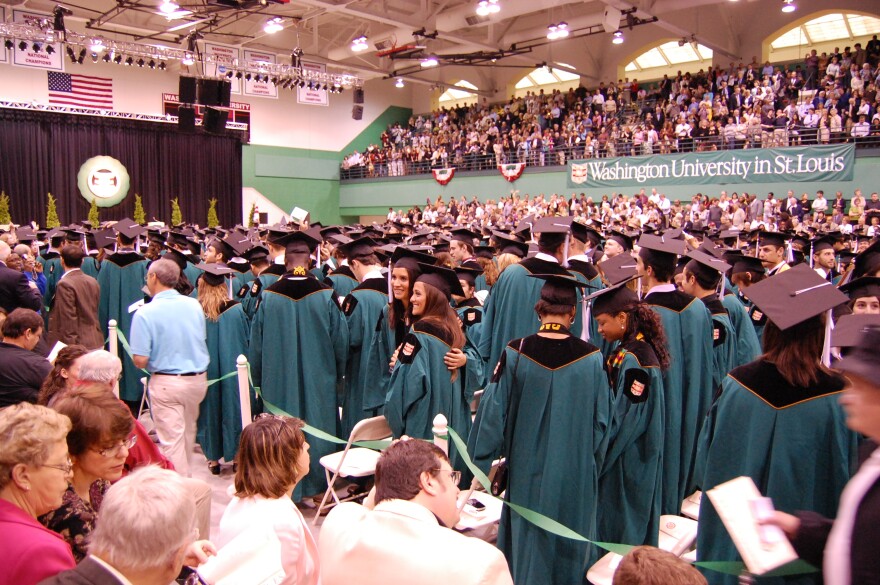Every year, thousands of students graduate from colleges and universities in the St. Louis region. So why are so many looking to take their talent elsewhere?
Local firm Stakeholder Insights conducted a study in collaboration with the St. Louis Regional Chamber to answer this question. Lisa Richter, Managing Principal of Stakeholder Insights, said that the study showed the main concerns graduates had when deciding to stay in the area were availability of jobs in their field, career growth opportunities, wages and benefits, a result that is no surprise.

Economic stability is of increasing importance for recent graduates as the cost of higher education continues to increase, she said. The study indicated that students felt St. Louis did not measure up to expectations in these areas.
Valerie Patton, vice president of Economic Inclusion and Talent Attraction at the St. Louis Regional Chamber, said that the study’s data is still encouraging in that it gives the Regional Chamber direction in its efforts to “attract, retain and engage more students throughout the region.”

Current college seniors Kyle Robbins, LelaPritchett, Brendan Williams and Marina Mills gave some first-hand perspectives on the issue. They pointed out that St. Louis has a lower cost of living than other cities as well as opportunities in their chosen career fields, but it feels like an aging city and lacks a strong public transit system.
“Basing myself in a city where the cost of living is relatively cheap, it just puts me in a better financial situation going forward,” Robbins, who attends Washington University said.
“If I want to live downtown I want to be able to get around without a car because that’s a huge expense, and in St. Louis I don’t always have that opportunity,” Williams, of Saint Louis University added.
In a conversation on Twitter, others added their insights:
@STLonAir I believe cities like CHI, NYC attract lifers because of opportunity. Towns like COMO don't. STL is solidly in the middle IMO.
— Michelle Niewald (@mniewald) May 9, 2016
Listener asks: "Are grads leaving b/c of racial divisions?" Did this factor in your decision to stay/leave #StLouis?
— St. Louis on the Air (@STLonAir) May 9, 2016
Better #publictransit, enviro #sustainability policies, #healthyfood access & safety are part of making #STL attractive to grads @STLonAir
— Caitlin Zera (@catlinzera) May 9, 2016
@STLonAir STL needs people to understand how other places work. Let 'em go if they want, but ask 'em what it'll take for them to RETURN.
— David Donovan (@BabaJebet) May 9, 2016
While it’s inevitable that some students will leave the region, Patton emphasized the importance of “telling the story better on what we do have to offer.” St. Louis is home to many startup companies and has a growing population of new businesses and entrepreneurs as well as established companies that are looking to bring in new talent.
While these opportunities may exist, a key factor that will retain graduates is fostering and building connections between employers and students to match needs. Patton says that one benefit of living in St. Louis is access. Connections between people in St. Louis can provide access to opportunities through networking. The challenge, then, is making the connections.
There is an initiative aimed at making those very connections. St. Louis Regional Chamber is working with the startup Better Weekdays whose product is the “eHarmony of talent,” Patton says. They are working to better identify candidates’ strengths, passions, and skill sets and to find a better fit on the corporate side for the jobs they are seeking to fill.
Richter echoes Patton’s sentiment that St. Louis is both big and small. “We’re big enough to have major employers across a range of industries, but we’re small enough that it’s easy to meet people who can hire us,” she said.
Patton mentions that one obstacle to college students staying in St. Louis is that some campuses in the region are “bubbles.” Many students who attend these schools tend to stay on or around the campus and miss out on exploring St. Louis as a whole. She says students need to take initiative and break down these bubbles to get to know St. Louis.
According to the study Stakeholder Insights conducted, one of the greatest mismatches was between the rated importance and St. Louis’ performance on providing equal opportunities regardless of race and ethnicity. Students also thought that the social climate of the city could be better.
May graduates: What’s your take? Are you planning to leave or stay in St. Louis after graduating? Tweet us your thoughts at @STLonAir.
College students: Will you leave or stay #STL after graduating? Why? cc: @WUSTL, @websteru, @SLU_Official, @umsl
— St. Louis on the Air (@STLonAir) May 9, 2016
St. Louis on the Air brings you the stories of St. Louis and the people who live, work and create in our region. St. Louis on the Air host Don Marsh, and producers Mary Edwards,Alex Heuer and Kelly Moffitt give you the information you need to make informed decisions and stay in touch with our diverse and vibrant St. Louis region.
Inform our reporting
This report was prepared with contributions from our Public Insight Network. Learn more about the network and how you can become a source for St. Louis Public Radio here. See more PIN responses to this query here.




